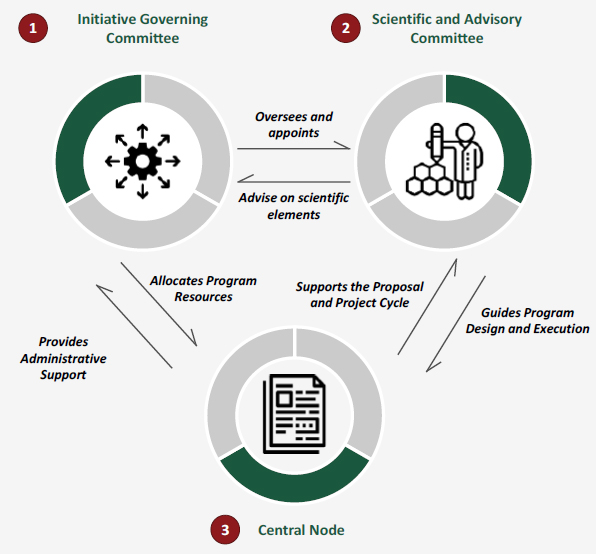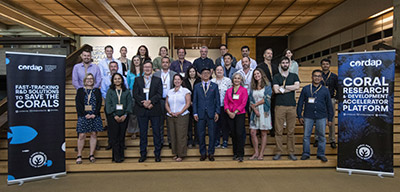Ocean Newsletter
No.533 October 20, 2022
-
CORDAP Unveils Strategic Plan to Accelerate R&D into Coral Restoration and Conservation
Carlos M. DUARTE (Executive Director, Global Coral Reef R&D Accelerator Platform)
There is great concern over the depletion of tropical and deep-water corals. The Coral Research & Development Platform (CORDAP.org) was established to accelerate international research and development for supplying the technologies and innovations required to secure a future for corals and reefs. I would here like to introduce the CORDAP strategic plan, soon to be approved.
-
A Legal System for the Sustainable Use of Marine Areas: From the Perspective of Marine Spatial Planning
HIGUCHI Eka (Associate Professor, Tohoku University of Community Service and Science)
In 2021, the United Nations launched the UN Decade of Ocean Science under the leadership of the Intergovernmental Oceanographic Commission of UNESCO. Does Japan's legal system for the use of marine areas (Sea Areas Utilization for Renewable Energy Act) adequately meet the elements of marine spatial planning required by the Intergovernmental Oceanographic Commission? In this article, I would like to identify future issues such as ensuring the participation of stakeholders in the establishment of goals and principles, and mapping process.
-
The Goals of Kanagawa University’s Research Institute for Marine and Port Studies
SEKIGUCHI Hiromasa (Director, Research Institute for Marine and Port Studies, Kanagawa University / Professor, Faculty of Business Administration, Kanagawa University)
In February 2022, Kanagawa University established the Research Institute for Marine and Port Studies at its Minato Mirai Campus to promote a multifaceted approach for researching the ocean (coastal and offshore) and ports (harbors/ports and fishing ports), as well as to serve as a center for industry-government-academia collaboration. Currently, the Institute has 14 members (12 faculty members and 2 senior researchers), and its main activities include research on marine industries, historical research on the ocean and ports, research on port functions, and research on community development in areas adjacent to ports.
CORDAP Unveils Strategic Plan to Accelerate R&D into Coral Restoration and Conservation
[KEYWORDS] climate change / G20 Environmental Ministers Meeting / open-source platformCarlos M. DUARTE
Executive Director, Global Coral Reef R&D Accelerator Platform
There is great concern over the depletion of tropical and deep-water corals. The Coral Research & Development Platform (CORDAP.org) was established to accelerate international research and development for supplying the technologies and innovations required to secure a future for corals and reefs. I would here like to introduce the CORDAP strategic plan, soon to be approved.
Decline of tropical and deep-water corals
Tropical and deep-water corals are an essential underpinning of the oceans’ biodiversity and human well-being, yet more than two thirds of the world’s tropical coral reefs have been lost due to human activity, with up to 90% of the remaining tropical reefs likely to decline in the decades to come even if the best scenario of the Paris Agreement, containing global warming at 1.5o C above pre-industrial levels, is achieved. Much less well known, deep-water corals have experienced massive losses even before we were aware of their presence, and are also threatened by human pressures, such as trawling and deep-sea mining, as well as climate change.
The prospect of losing up to 90% of coral reefs even under the best climate change scenario is not an acceptable one, as it will condemn generations to come to live in a world depleted of coral reefs and the marine life they support. This prospect also involves losses of essential fishery resources and coastal protection to tropical island states, which risk losing much of their territory under rising sea levels and increased storminess. It is, therefore, clear that the current science and technology supporting such negative prospects is not good enough. While efforts to remove human pressures, including climate change, are absolutely essential, securing a future for coral reefs also requires that the current science and technology basis be replaced by next-generation science and technology that helps secure a future for coral reefs.
Start of CORDAP
The Coral Research & Development Platform (CORDAP.org) is a G20 initiative announced in 2020 to bring together the best minds around the world, in a transdisciplinary approach, to accelerate international research and development to supply the technologies and innovations required to secure a future for corals and reefs. Following a year when governance and operational principles were designed and the governing bodies were established, the release of CORDAP’s strategic plan signals that CORDAP is ready to fulfil its mission.
Focusing on research and development and committed to scalability, CORDAP-funded projects will accelerate the research and development of next-generation solutions to conserve and restore corals and reefs on a much broader scale, delivering far greater impacts. Its open-source platform model will allow anyone to advance and use the platform’s technologies, will be transdisciplinary, equitable and inclusive, and will strive for efficiency. Finally, every penny of international funding the platform receives will go directly to its R&D and other projects, with King Abdullah University of Science and Technology (KAUST) acting as the Platform Central Node supporting all CORDAP operations.
CORDAP is led by an initiative governance committee (IGC), made up of representatives of the G20 nations contributing to CORDAP. Japan is represented in the Initiative Governance Committee by Mr. Eiji Tanaka, Ministry of Environment, and, with an observer status, the Japanese Coral Reef Society (JCRS), represented by Dr. Atsushi Watanabe. The program’s priorities and project selection are determined by a Scientific and Advisory Committee, composed of a gender- and regional- balanced group of scientists contributing a broad set of skill sets. The Platform Central Node provides all the administrative support required to operate CORDAP.
Strategic plan for CORDAP
CORDAP’s strategic plan, prepared by its Scientific and Advisory Committee, identifies how it will deliver the program, describes the types of projects it will fund, outlines the proposal submissions, and reviews processes and the priority investment areas for 2022. This strategic plan focuses on the most pressing investment needs for directing the program over its first three years of operation.
The 2022-2025 strategic plan sets out how CORDAP will develop and deliver a number of targeted research funding programs. CORDAP will invest in novel early-phased ideas through to final proof-of-concept development and testing. Six project types have been identified: Novel R&D projects, improving or scaling up existing interventions, translation R&D, scoping and planning studies, foundation science to support implementation of interventions, capacity building and local implementation. Funding will also be considered for proposals that will require further planning before direct projects may be effective as well as for projects that will require a broader suite of research and engagement before they are impactful.
CORDAP’s open-source platform will play an essential role in enabling solutions to conserve and restore corals and reefs, to be used on a much broader and accelerated scale than many of the typically localized and small-scale intervention methods currently in deployment. To maximize innovation and diversity of thinking, CORDAP’s calls for proposals will be open to all submissions within its scope and investment criteria.
The strategic plan was developed by CORDAP’s Scientific and Advisory Committee, an international group who are responsible for developing and updating the strategic direction of research and designing and directing the research and development program, which is then approved by CORDAP’s Initiative Governing Committee.
We issued our first call for proposals in this summer through our website https://cordap.org/. Respondents will initially submit short concept notes which, if selected, will be the basis for full proposal submissions that will be assessed by independent experts before being evaluated by our Scientific and Advisory Committee. Innovation is critical to filling what remains a sizeable gap between existing and required capabilities, and we will be looking for ideas that create impact.
We call all to join in.
 Interaction model between the different components of CORDAP
Interaction model between the different components of CORDAP
 Photo of the combined meeting of the Initiative Governance Committee and the Scientific and Advisory Committee of CORDAP held in Lisbon, Portugal, on 26 June, 2022
Photo of the combined meeting of the Initiative Governance Committee and the Scientific and Advisory Committee of CORDAP held in Lisbon, Portugal, on 26 June, 2022
